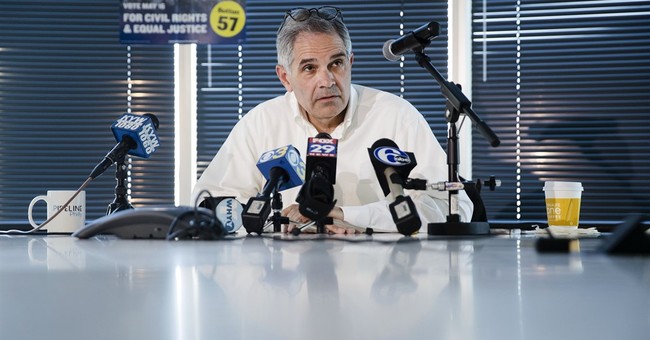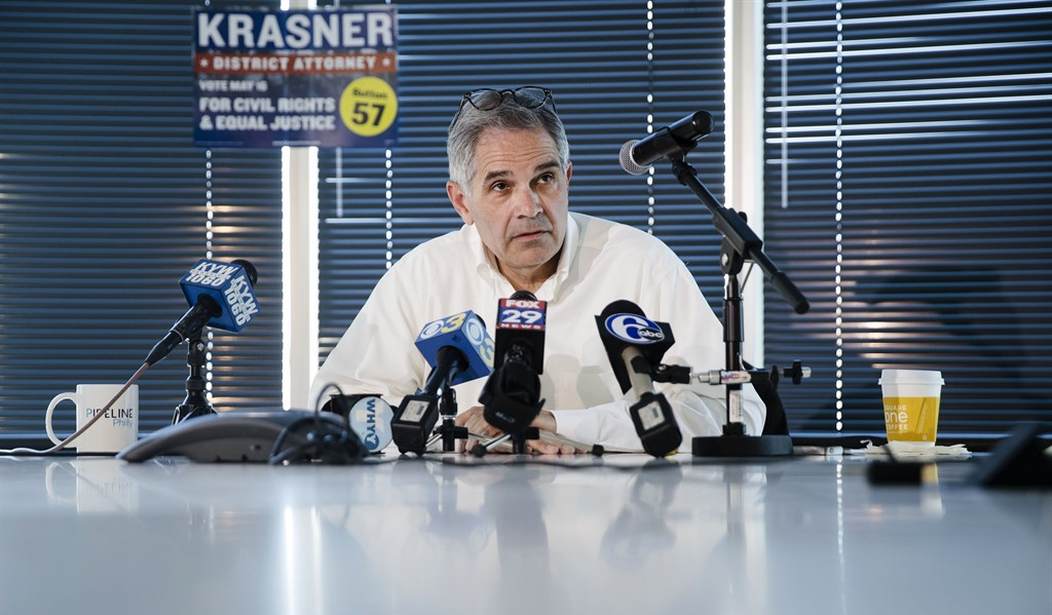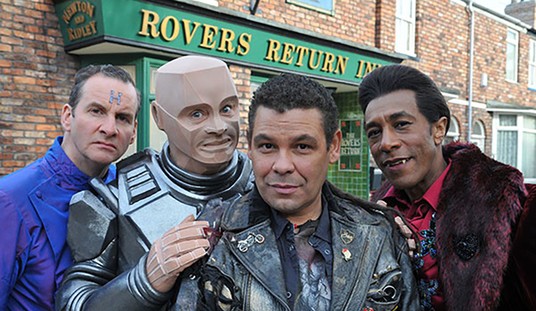
With their history, I’m quite certain the US Attorney for the Eastern District of Pennsylvania paid close attention to the comments of Philadelphia District Attorney Larry Krasner on Monday in an interview with Bloomberg City Lab.
If I were the US Attorney in Philadephia witnessing what Larry Krasner has done to law enforcement in Philadelphia, I would be looking for any opportunity he gave me to sideline him — the lives and safety of Philadelphians and the law enforcement in Eastern Pennsylvania quite literally depend on it.
Krasner was a prominent Philadephia defense attorney whose campaign for DA in 2018 was funded by George Soros. He was in the vanguard of ultra-liberal candidates for county prosecutor who ran for office in big cities on promises to end cash bail and target police misconduct for prosecution while looking for a wider array of excuses to NOT prosecute actual criminals committing crimes in those cities. Similar candidates prevailed for the office of top prosecutor in San Francisco, Brooklyn, St. Louis, Boston, and Dallas among others.
My concern here is not so much about who Krasner is and how he came to be, but rather the serious implications under federal law of what he is suggesting he might be willing to do if Pres. Trump sends federal law enforcement agents to Philadelphia in response to provocations by Antifa, BLM, or other groups targeting federal facilities or properties.
What is becoming increasingly clear in Portland is that the riots there are no longer about police misconduct or what happened to George Floyd in Minneapolis — assuming they ever were — but instead, the rioters riot for the sole purpose of provoking confrontations with the federal law enforcement agents who have been left alone to defend the federal facilities. Liberal moron city leaders like Portland Mayor Ted Wheeler are content to watch their cities burn without local police intervention because they think it hurts Pres. Trump politically ahead of the November Presidential election. All in pursuit of the “greater good”, I guess.
But to date, useful idiots like Mayor Wheeler have limited themselves to only demanding that the federal law enforcement agents be removed from their cities. Philly DA Krasner, in order to rise above the din and be noticed, went on record earlier this week threatening to arrest and prosecute any federal law enforcement agent who “unlawfully assaults or kidnaps” citizens of Philadelphia in any similar federal response to rioting at federal buildings in the city.
Let’s consider some of his remarks as quoted in the Bloomberg article [I’ve edited some of the questions and answers for purposes of brevity — please read the full article for his complete remarks]:
What is your understanding of the legality of the Trump administration deploying officers in any city in this context?
There are certain areas of shared jurisdiction between federal and local authorities, and frankly, there’s a frequent collaboration between federal and local law enforcement on certain types of cases. Often it’s cases involving drugs and guns or explosives, for example….
What’s unusual here is the fluffy rhetoric about taking over cities…. And what is really unusual is the apparently illegal stormtrooper tactics that have been used by federal law enforcement in Portland.
It is not OK to fracture skulls with what they like to call non-lethal rubber bullets or tear gas canisters. It is not OK when there is no probable cause to jump out of a rental van and just requisition people off the street. That looks like a dictatorship. That looks like a kidnapping. That looks like a crime….
So you are prepared to prosecute federal law enforcement officials if they do in Philadelphia what they are doing in Portland?
If we have clear probable cause for the commission of crimes, by anyone, including law enforcement, including federal law enforcement, we will prosecute that. We’re not going to tolerate any kidnappings and assaults going on in Philadelphia streets….
Is there precedent for this — local police arresting federal police?
There are instances, and there have been in many major cities. Often it relates to corruption where you have arrests that are made…. The Philadelphia police department and the Philadelphia D.A.’s office, absolutely have jurisdiction to arrest and to charge federal law enforcement officials if they commit crimes….
Can you walk us through what that would look like?
… [T]he primary investigative agency is the police department. But it can originate within the D.A.’s office, where we then collaborate with the police or where we do it without the police using our own attorneys, D.A. detectives, etc. Sometimes there is simply an arrest and we charge them by complaints or we can convene a grand jury where in a less public fashion, civilians decide whether or not there is probable cause to arrest a person for the commission of crime….
I would like to think that this mayor and this reform commissioner mean what they say when they say we’re not going to tolerate federal law enforcement committing crimes on Philadelphia streets. I think they probably do…. I’m not going to tolerate it. And the D.A.’s office is able to act either independently or in collaboration with the Philadelphia police department.
…..
Acting Homeland Security Chief Chad Wolf said he doesn’t need cities’ permission or invitation to send troops in. What’s your response to that?
It is true that the feds can travel pretty much wherever they want, as long as they’re obeying the law. It is also true that it is inappropriate and uncommon for them to try to do law enforcement activity without coordinating with local authorities…,
Do we need clearer laws and guidelines around what federal law enforcement officials can and cannot do when they’re in a city jurisdiction?
No, I actually think the law is adequate…. I mean, here’s the reality. He’s talking about deploying 150 federal law enforcement [officers] to Chicago. The police force in Chicago is over 12,000 people. He’s talking about deploying maybe the equivalent of 1% of their ordinary active police force. This is fluff. This is politics. This has nothing to do with actual law enforcement. It is a diversion of tax funds to try to bolster a campaign that is close to defunct.
……
President Trump has signaled an intention to deploy federal law enforcement agencies to other cities around the country. On June 26, he signed an Executive Order directing that law enforcement resources be targeted to protecting federal property and monuments around the country. This came largely in response to the wave of violence targeting various statues and historical monuments around the country, some of which were on federal property.
But the violence directly targeting the federal courthouse in Portland has focused attention now on the need to protect similar buildings in other cities as the tactics employed by Antifa/BLM and other sympathetic groups are likely to spread in a “copy-cat” fashion because of the notoriety and attention that Portland is now receiving.
For a local prosecutor to suggest that he might respond to such an effort with criminal investigations and prosecutions of the federal agents sent to defend federal property is to dance closely on the line of potential criminal conduct by the local prosecutor himself.
Title 18, United States Code, Section 1512(a) provides as follows:
(2) Whoever uses physical force or the threat of physical force against any person, or attempts to do so, with intent to—
(A) influence, delay, or prevent the testimony of any person in an official proceeding;(B) cause or induce any person to—
(i) withhold testimony, or withhold a record, document, or other object, from an official proceeding;(ii) alter, destroy, mutilate, or conceal an object with intent to impair the integrity or availability of the object for use in an official proceeding;(iii) evade legal process summoning that person to appear as a witness, or to produce a record, document, or other object, in an official proceeding; or(iv) be absent from an official proceeding to which that person has been summoned by legal process; or(C) hinder, delay, or prevent the communication to a law enforcement officer or judge of the United States of information relating to the commission or possible commission of a Federal offense or a violation of conditions of probation, supervised release, parole, or release pending judicial proceedings;shall be punished as provided in paragraph (3).
It would be a bit of a unique and odd application of this section, but at a very basic level, a federal law enforcement agent acting in his official capacity is a “witness” to criminal activity. It’s a job function to be a “witness” to criminal activity — that’s what they do.
The “intent” element under federal law is satisfied by showing that the actions were intentionally undertaken, i.e., they were not accidental. It is not necessary to prove that a defendant “intended” to violate the law, i.e., that he “intended” to “obstruct.” The key is simply that he intended his actions, and his actions did obstruct justice.
The threat to “arrest” a federal law enforcement agent acting in his official capacity is a “threat” to use “physical force” against a witness to a federal crime. That threat could cause a federal law enforcement agent to not act in a manner he/she would otherwise act absent the threat — including by failing to take action or report information known to that agent out of fear of prosecution by the Philadelphia DA.
Threatening arrest and a local prosecution could induce a federal agent to be absent from an official proceeding — such as a grand jury session or a federal preliminary hearing against an arrested protestor — out of fear that any comments made in such a proceeding could be used by the Philadephia DA in a state prosecution.
Threatening to arrest — or even arresting — a federal law enforcement agent could hinder, delay, or prevent communication by that agent to other law enforcement or court of the United States information the law enforcement agent has about the commission of federal offenses witnessed by the agent arrested.
Noteworthy is the fact that the current version of Sec. 1512 does not require that there be a “pending proceeding” at the time of the obstructive conduct alleged to be a crime. The DOJ Manuel on Federal Prosecution states:
18 U.S.C. § 1512 is not limited by the “pending proceeding” requirement of §§ 1503 and 1505. Accordingly, it is not necessary to show that an official proceeding is pending or about to be instituted at the time of the offense.
Thus, the only requirement is that the federal law enforcement agent is a potential witness to the commission of federal crimes. Agents being used in a role involving the protection of federal property from damage or destruction would be witnessing federal crimes if rioters were outside the federal facility engaging in conduct similar to that taking place in Portland.
DA Krasner’s announcement of his intentions, combined with any discussions between him and people in his office, or other officials in the City of Philadelphia about a plan to follow through on his intentions, could begin to form the outline of a “Conspiracy to Obstruct Justice” charge.
The fact that DA Krasner might believe himself to be acting lawfully in his role as prosecutor of state criminal conduct is unlikely to save him from his folly. Section 1512(a)(2) does not require that the actions undertaken be done so “corruptly.”
Sec. 1515(b) defines “corruptly” as “acting with an improper purpose.” Because “corruptly” is included in the language of Section 1512(b), but does not appear in the language of Section 1512(b), it is not necessary to prove that in announcing his intentions DA Krasner was “acting with an improper purpose.” The natural effect of his stated intentions is to intimidate and potentially hinder federal law enforcement agents from doing their jobs.
Local law enforcement conspiring to interfere with federal investigations is not a new or unique criminal matter. Normally there is some level of “corruption” involved, whether it be acceptance of a bribe from a target or just a close personal association with someone who is in the sights of federal agents.
But in DA Krasner’s case, being an arrogant and pompous ignoramus as to the limits of his own authority and possible consequences of his own words and actions is possibly enough.
Gaining a conviction under the circumstances might be a stretch. But maybe DA Krasner and others expressing support for his intentions should ask Gen. Flynn about how much fun it is to be ground down by DOJ processes.
If Philadephia DA Larry Krasner really wants to go down this road and pick a fight with the US Department of Justice, he’s bringing a proverbial dull butter knife to a fight with a nuclear-armed superpower.















Join the conversation as a VIP Member